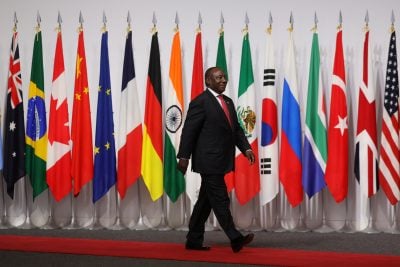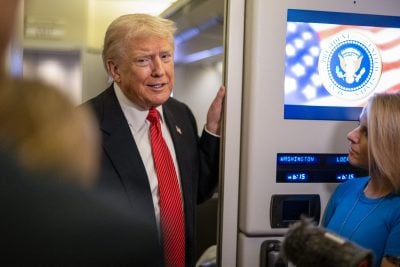President Bola Tinubu criticised the country’s central bank in his inaugural speech on 29 May, saying that monetary policy requires a “thorough house-cleaning”. And indeed on 14 June the Central Bank of Nigeria (CBN) announced the unification of all segments of the foreign exchange (FX) market – replacing the old regime of multiple exchange rate “windows” for different purposes with, in effect, a market rate.
The naira immediately fell 36% against the dollar on the official market.
Analysts tell African Business that they expected this move from Tinubu when, on 9 June, he suspended Godwin Emefiele as governor of the CBN. Folashodun Shonubi, a deputy governor in charge of operations at the bank, has taken over in an acting capacity. Emefiele was also detained by police “for investigative reasons”.
The president was “clearly signalling that he will be hands-on in steering the CBN’s monetary policy thrust,” Ikemesit Effiong, head of research at SBM Intelligence, tells African Business: “Emefiele’s suspension puts the final nail in the coffin of monetary policy independence.
“Whoever Tinubu appoints as governor will have no doubt about what their remit is.” The multiple exchange rates have been blamed for keeping the naira artificially strong.
Some investors have hailed President Tinubu for his aggressive moves, seeing them as signals that he is keen on resetting the country’s economy on an orthodox path. The currency moves followed the scrapping of a fuel subsidy that cost the country $10bn last year. That was announced in the inauguration speech and two days later state oil company NNPC said the pump price of petrol had risen more than 200% from N189 per litre to between N480 and N570 per litre.
On 14 June Tinubu also suspended Abdul Rasheed Bawa, the head of the nation’s anti-graft agency, the Economic and Financial Crimes Commission.
Willing buyer, willing seller
Earlier on 14 June, the CBN made operational changes to the foreign exchange market. It reintroduced the willing buyer, willing seller market model to trading at the investors and exporters (I&E) window, in a move towards liberalising the market. The I&E window already had a lower naira rate than the CBN main official rate.
Tinubu’s team “knows they don’t have a honeymoon period from a governance standpoint – which means that he is pretty much liberated to pursue significant, painful economic reforms early in his tenure,” Ikemesit Effiong says of the move to liberalise the market and unify the multiple exchange rates.
The liberalisation of the market signalled the removal of some of the restrictions on the foreign exchange rate in the official market.
“The devaluation and unification should bring an end to the multiple foreign exchange markets and rates, which have disincentivised business activities and deterred foreign investments,” Ayodeji Dawodu, head of Africa research at UK-based BancTrust, says in a 14 June note to investors: “We note that most of the goods and services in the economy were actively being priced closer to the parallel market rate, which could limit the inflationary impact of the move for now.”
However, as gas prices were based on the official rate, this could mean higher electricity tariffs could be on the horizon, “while an overshoot in the rate could force the government to raise fuel prices again. We note that the impact of the devaluation on local banks could be mixed as the larger banks tend to hold a net long foreign currency position on their balance sheets, which would cushion the negative impact of a currency devaluation on capital adequacy,” he says in the note.
Investors’ reactions
On 13 June Nigeria’s stock market anticipated the move, jumping to its highest level in 15 years after the suspension of the CBN governor. The index of the Nigerian Stock Exchange soared 4% higher on the day to a closing price of 58,164 points, sending stocks’ year-to-date gains to 13.5%. The stock market continued its rally after the CBN liberalised the market, with market capitalisation climbing 3.26% to reach N32.7 trillion on 15 June, demonstrating the increased value of listed companies on the stock exchange.
The number of deals executed on 14 June showed a 15% increase compared to the previous trading period, with volume of trade rising by 9.28% to show increased market participation and increased liquidity.
“Investors generally have positive sentiments towards the idea of Nigeria unifying its exchange rates,” Daniel Sodimu, former sub-Saharan Africa analyst at FrontierView, tells African Business. “Multiple exchange rates have been a source of confusion for investors. When they bring in funds at the official exchange rate and can only repatriate their earnings at the black-market rate, they make conversion losses on their investments. Investors recognise that a unified exchange rate should help alleviate these problems and improve the ease of doing business in Nigeria.”
Sodimu says that unifying the exchange rates could help prop up investors’ confidence in the Nigerian markets. Investors have faced limited access to foreign exchange at the official rate and have been unable to repatriate funds from the country.
For example, in early June 2023 the International Air Transport Association (IATA) reported that out of the $2.3bn globally owed to its members, $812m is trapped in Nigeria. “This problem further discourages foreign investment and FX inflows, intensifying FX scarcity and compounding the problem. Investors recognise that a unified exchange rate should help alleviate these problems and improve the ease of doing business in Nigeria,” Sodimu says.
FX unification and FDI
Nigeria has been struggling to attract foreign direct investment (FDI) in the last few years, with investment falling by as much as 90% since 2008.
A severe dollar shortage has seen companies flee the continent’s biggest economy as investment fell to $468m in 2022 from $698m a year earlier, according to data from the National Bureau of Statistics.
Last year Emirates Airlines halted flights to the country due to dollar shortages and restrictions on repatriating funds. With the foreign exchange unification Sodimu sees “a modest improvement would likely be noticeable within several months… and steadily gain traction beyond that. However, this depends on investors’ confidence that the policy change will be thorough and lasting.
“FX challenges are top of mind for multinational companies bringing FDI into Nigeria. Their inability to repatriate earnings in full has kept FDI below its potential, with inflows to smaller neighbours like Ghana outpacing Nigeria’s in recent years. Multinationals presently in Nigeria remain cautious about increasing their exposure, and investors considering entering the country feel they need to play it safe or adopt a wait-and-see approach. Also, FX has been a key problem driving a handful of companies to divest in recent years.”
Dawodu, meanwhile, sees government policies encouraging FDI inflows, but says it “would take time, because of the trust deficit created by the past administration… FPI [Foreign Portfolio Investment] inflows may be quicker, especially if the unification is supported by higher interest rates to offer real returns.”
How will consumer price inflation change?
With the monetary reforms comes a devaluation of the naira – which was overvalued by at least 250% in 2021 according to the Rand Merchant Bank “milk index”. Rate unification and the resultant devaluation could mean a further squeeze in the cost of living, Dawodu says. “We are starting to see the impact of the removal of subsidy on the cost of transportation, and soon on the price of goods and services. If the depreciation occurs sooner rather than later, you worry about the squeeze on cost of living all at once and how much the population can take before we start to see social unrest,” he says.
These effects could be short-lived, according to Sodimu, who says “although sizeable currency weakening is usually associated with a sharp surge in inflation in the short term, the fact that the vast majority of people and businesses currently access FX at the expensive black-market rate in Nigeria means that the inflationary impact of a devaluation of the official would likely be limited.”
More borrowing still on the books
Still, it’s not clear whether President Tinubu’s fiscal policy is moving in a more sustainable direction, cautioned analysts at Capital Economist. “Admittedly, the removal of fuel subsidies, which last year amounted to more than 2% of GDP, creates a big fiscal saving. But it looks most likely that the resources will be spent rather than saved after the president pledged that the funds will be channelled into ‘public infrastructure, education, health care and jobs’.
“That reinforces our view that the debt-to-GDP ratio will continue to rise, leaving open the possibility of fresh borrowing from the central bank and other distortive policies aimed at keeping borrowing costs artificially low. Keeping fiscal policy loose would, clearly, not aid the CBN’s inflation fight either,” analysts say in a note to investors.
Want to continue reading? Subscribe today.
You've read all your free articles for this month! Subscribe now to enjoy full access to our content.
Digital Monthly
£8.00 / month
Receive full unlimited access to our articles, opinions, podcasts and more.
Digital Yearly
£70.00 / year
Our best value offer - save £26 and gain access to all of our digital content for an entire year!

 Sign in with Google
Sign in with Google 



